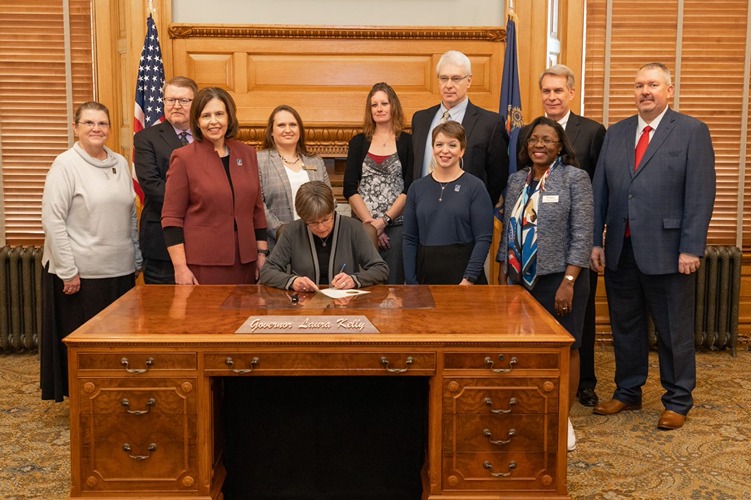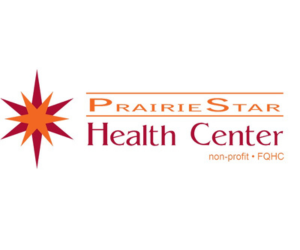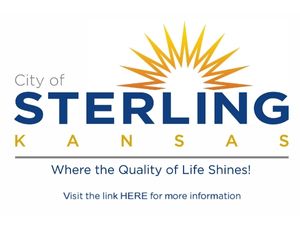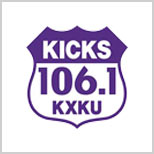TOPEKA, Kan. — February is Career and Technical Education (CTE) Month®, which celebrates the value of CTE and the achievements and accomplishments of CTE programs across Kansas and the nation.
Kansas Gov. Laura Kelly last week signed a proclamation designating February as Career and Technical Education Month in Kansas.
Career and Technical Education (CTE) plays a powerful role in preventing students from dropping out of school and provides a wide variety of opportunities for postsecondary success and employment, according to the Association for Career and Technical Education (ACTE).
Students who are involved in CTE have a higher graduation rate and see higher earnings, according to ACTE. In fact, the average high school graduation rate for CTE concentrators – students who take multiple courses in one CTE program area – is 94%, compared to the national rate of 85%, ACTE states. In the 2021-2022 school year in Kansas, the four-year graduation rate for CTE concentrators was 98.59%.
CTE concentrators are more likely than nonconcentrators to enroll in postsecondary education and are just as likely to earn a degree or certificate. High school CTE concentrators are also more likely than nonconcentrators to be employed full-time and have higher median annual earnings eight years after graduation, according to ACTE.
The theme for CTE Month is Celebrate Today, Own Tomorrow! This month provides CTE programs an opportunity to demonstrate how CTE makes students college and career ready and prepares them for high-demand career fields.
CTE in Kansas embraces the needs of business and industry by developing foundational knowledge and skills aligned to the Kansas workforce.
The vision for Kansas education is to lead the world in the success of each student. CTE classes play an important role in helping the state meet that goal by making sure students are prepared for postsecondary success – whether that be entering the workforce, obtaining an industry-recognized certification or attending a two-year or four-year college.
Kansas has 16 Career Clusters for students to choose from and 36 Career Cluster Pathways.
A Career Cluster is a group of occupations similar in skill set and training. Career Cluster Pathways are focused and specific areas of study leading to a particular industry or business area. These occupations fall within seven career fields in Kansas — agriculture; business; family and consumer sciences; public services; media and technology; health; and design, production and repair.
Nationally, 94% of high school students have taken a CTE course by the time they graduate, and CTE encompasses 8.4 million postsecondary students seeking certificates and associate degrees in CTE fields, according to ACTE. In Kansas, more than 85,000 Kansas students enrolled in CTE courses last school year. During the 2021-2022 school year, 54,774 Kansas students earned one secondary-level credit in a single CTE pathway, and there were 30,441 CTE concentrators. There were 23,657 Kansas students who were members of Career and Technical Student Organizations (CTSOs).
CTSOs enhance this instruction by offering opportunities to apply what is learned in a variety of ways, interact with adults in their selected Career Pathway, develop leadership and employability skills and address community issues through in-depth projects.
Many Kansas school districts have outstanding CTE programs in place. Here are a few that can be highlighted for a CTE Month story:
- Maize Career Academy, Maize USD 266. The goal of the Maize Career Academy is to help students be college and career ready through hands-on learning with real-world applications. There are more than 20 Career Pathways for students to explore – from Teaching and Training to Emergency and Fire Management and Health Science. Dr. Lindsay King serves as the Academy principal. For more information or to schedule an interview, contact Lori O’Toole Buselt, Maize USD 266 director of communications, by email at [email protected] or by phone at 316-350-2021.
- Regional Rural Technical Center (RRTC), Iola USD 257, in LaHarpe. This innovative center offers several programs to high school juniors and seniors, including wind energy, health occupations and welding and construction technology. It serves several area school districts. For more information or to schedule an interview, contact Lisa Wicoff, Iola USD 257 CTE coordinator, at 620-365-4715.
- Hutchinson Career and Technical Education Academy (CTEA), Hutchinson USD 308. Students can choose from a variety of courses and programs that include college credit and industry certifications. For more information or to schedule an interview, call Marissa Meis, Hutchinson USD 308 director of communications, at 620-615-4048 or Travis Riebel, director of CTEA, at 620-615-4123.
For more information about CTE in Kansas, visit https://www.ksde.org/Agency/Division-of-Learning-Services/Career-Standards-and-Assessment-Services/CSAS-Home/Career-Technical-Education-CTE.
















































